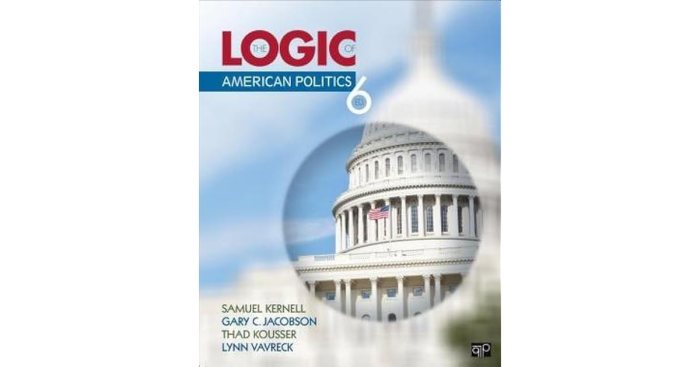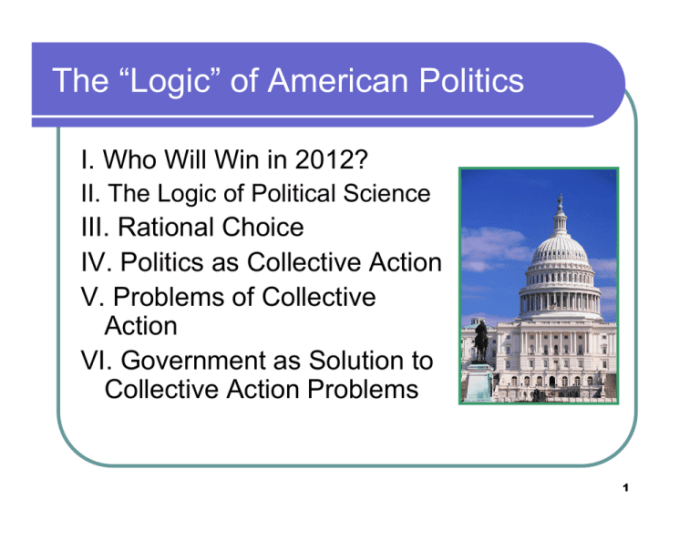Logic of american politics 11th edition pdf – Logic of American Politics, 11th Edition PDF, a seminal work in political science, invites readers to delve into the intricate workings of American governance. This comprehensive guide explores the historical evolution, institutional frameworks, and contemporary challenges shaping the American political landscape.
The book delves into the foundational principles of American democracy, examining the separation of powers, checks and balances, and the role of political parties and interest groups. It analyzes the dynamics of policymaking, public opinion formation, and political participation, providing a nuanced understanding of the forces that drive American politics.
1. Logic of American Politics, 11th Edition: Logic Of American Politics 11th Edition Pdf

The eleventh edition of Logic of American Politics provides a comprehensive overview of the American political system. The book is divided into seven parts, each of which covers a different aspect of American politics.
The first part of the book introduces the basic concepts of American politics, such as democracy, federalism, and separation of powers. The second part examines the historical development of American politics, from the founding of the republic to the present day.
The third part describes the structure and functions of the major institutions of American government, including the presidency, Congress, and the Supreme Court. The fourth part analyzes the role of political parties and interest groups in American politics.
The fifth part examines public opinion and political participation in the United States. The sixth part explains the process of policymaking in the United States, from agenda-setting to implementation. The seventh part discusses some of the most pressing contemporary issues in American politics, such as healthcare, climate change, and gun control.
Key Themes and Concepts
- Democracy
- Federalism
- Separation of powers
- Political parties
- Interest groups
- Public opinion
- Policymaking
2. Historical Context
The American political system has evolved over time, from its origins in the colonial era to its present-day form. The founding fathers established a system of government based on the principles of democracy, federalism, and separation of powers. These principles have served as the foundation of American politics for over two centuries.
The United States has faced many challenges throughout its history, including the Civil War, the Great Depression, and the Cold War. These challenges have tested the strength of the American political system, but the system has ultimately prevailed.
Major Political Events and Movements
- The American Revolution
- The Civil War
- The Great Depression
- The Cold War
- The Civil Rights Movement
- The Vietnam War
- The Watergate scandal
- The 9/11 attacks
3. Institutions of American Government

The American political system is based on a system of checks and balances, in which the different branches of government have the ability to limit the power of each other. This system was designed to prevent any one branch of government from becoming too powerful.
The three branches of the American government are the legislative branch, the executive branch, and the judicial branch. The legislative branch is responsible for making laws. The executive branch is responsible for carrying out laws. The judicial branch is responsible for interpreting laws.
Presidency
- The president is the head of state and government of the United States.
- The president is responsible for carrying out the laws of the United States.
- The president is also the commander-in-chief of the armed forces.
Congress, Logic of american politics 11th edition pdf
- Congress is the legislative branch of the American government.
- Congress is responsible for making laws.
- Congress is also responsible for overseeing the executive branch.
Supreme Court
- The Supreme Court is the highest court in the United States.
- The Supreme Court is responsible for interpreting the laws of the United States.
- The Supreme Court also has the power to declare laws unconstitutional.
Checks and Balances
- The president can veto laws passed by Congress.
- Congress can override a presidential veto with a two-thirds vote.
- The Supreme Court can declare laws passed by Congress unconstitutional.
User Queries
What is the main focus of Logic of American Politics, 11th Edition?
Logic of American Politics, 11th Edition provides a comprehensive overview of the American political system, covering its historical development, institutional structures, and contemporary challenges.
What are the key themes explored in the book?
The book explores themes such as the separation of powers, checks and balances, the role of political parties and interest groups, public opinion formation, policymaking, and contemporary issues facing American politics.
Is the book suitable for both students and general readers?
Yes, Logic of American Politics, 11th Edition is written in an accessible style, making it suitable for both students and general readers interested in understanding American politics.